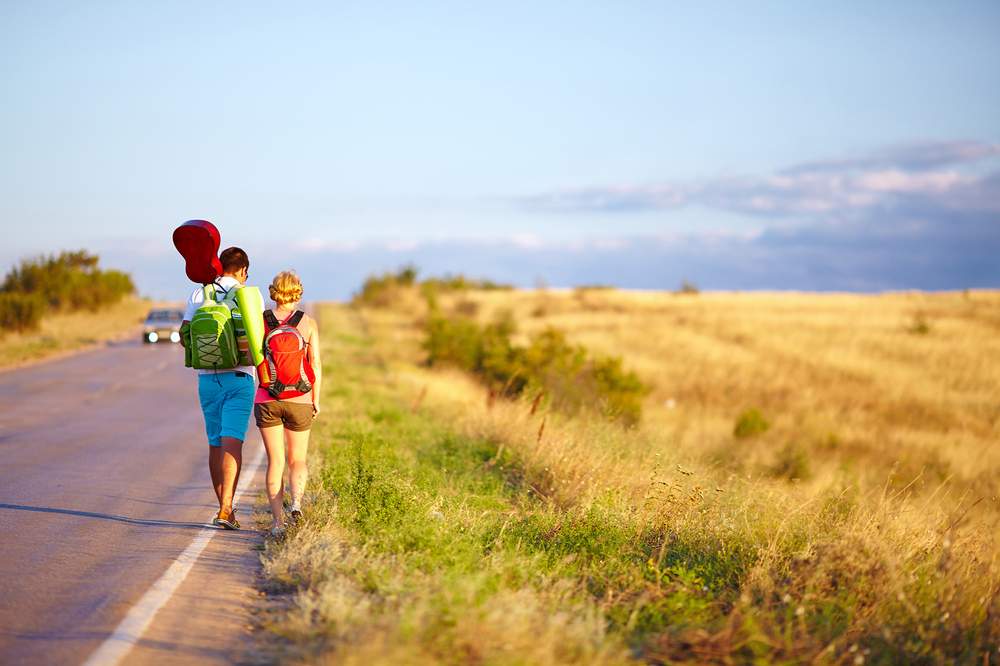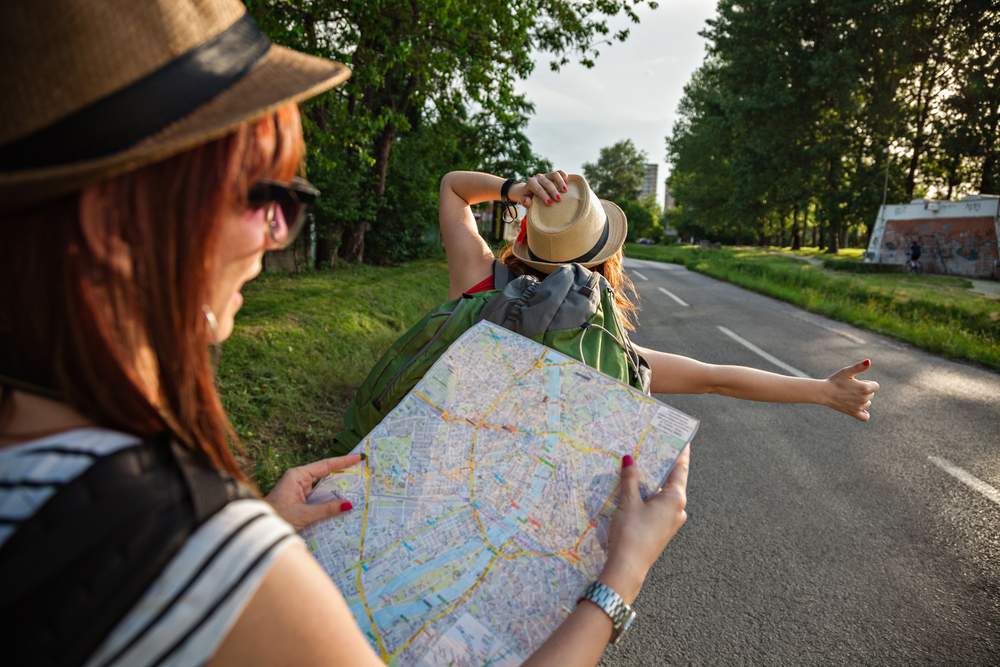Whatever the reason; however, one thing remains certain: when hitchhiking, you can never predict what is going to happen. You don’t know have many kilometers you will go. You don’t know where you will sleep. You don’t know whether your driver will be angelic or evil.
For many it is this uncertainty that makes hitchhiking so entrancing. Life is so chaotic and unpredictable, and the act of hitchhiking, of standing on the road and basically offering up your fate to a stranger (and expecting that they will be good) becomes a metaphor for the way our lives are often blown off course and propelled by adventitious forces.
Hitchhiking requires a certain inward disposition and considerable patience. There will be times when you wait no more than a minute, but there will also be times when you wait ten hours. There will also be times when your driver becomes a lifelong friend, and times when you will endure the most uncomfortable silences. Perhaps, although it is unlikely, something traumatic may happen. You must be prepared to accept these risks.
As you embark on your first few rides you will come to know the following truths intimately. But for the newbies, or those who have only entertained vague fantasies of hitchhiking, here are a few suggestions to keep you safe and get you going.
1. Throw away your plans
To truly enter the hitchhiking spirit you must abandon pretty much all of your plans, otherwise you risk the stress of watching them evaporate. When you are hitchhiking, you never know where you will end up, or when you will arrive, or even if you will arrive at all. This is part of the adventure. Additionally, having rigid plans while hitchhiking makes you more likely to turn down potentially intriguing offers from your driver.

2. Bring a buddy
Standing alone on the side of the road for hours can make you feel forlorn and lonely. Having a companion to ricochet your thoughts off of will help ameliorate this. Having someone along also makes it less likely the driver will attempt something nefarious.
There are certain partner combinations you want to aim for. First, any group with more than three hitchers would be unadvisable, as this considerably reduces your rides on account of available space. Also, a group of three hitchers, unless they are all female, may seem menacing. Two is the ideal number here. Two females is the ideal sex coupling as pretty much 70% of the population is willing to pick up girls. Having two around also lessens the likelihood of a negative experience. Next best is a 50/50 sex ratio. Once again, having a female seems to somewhat pacify the male companion in the mind of the driver, and for the female, having a male often raises your clout when it comes to physical retaliation should your driver entertain thoughts of attempting something weird.
Also, be sure to choose your hitching buddy wisely. Make sure they understand what hitchhiking entails. The second worse thing to have to deal with and which really blows dark clouds over the whole experience is having to crouch on the side of the road all day with someone who isn’t in the mood and whines about the waiting.
>> Read about the pros and cons of solo travel
3. Dress accordingly
Bright colors are valuable in this regard, as they emanate out of you an attitude of comely approachableness. But just appearing clean and wearing not-likely-to-stink-up-the-driver’s-new-Fiat-with-some-weird-swamplike-odor attire will score you considerable sympathy when the driver is half-consciously gazing at you on the side of the road and making a split-second decision of whether or not to pull over.
Also try not to wear any clothes that reveal you’ve been sweating, and unless the sun is literally blasting you away, remove your sunglasses so you can make eye contact with the driver. This help to stir up pathos. Also probably best to lose the beard or at least trim it below wizard length.
>> Check out our Travel Gear Page to see what type of clothing and gear we recommend
4. Location
If you try hitchhiking within or just outside an urban area, you’re probably never going to get a ride. City people out on errands or commuting to work are not interested in you. Arrange for a ride or take a train or bus or skip or walk far, far beyond the city limits before you begin trolling for rides. If walking, it doesn’t hurt to thrust your thumb out to notify potential Good Samaritans of your objective (best to do this while walking backwards and making eye contact). Once you come upon a good location with plenty of room for motorist to pull over and perhaps a little shade if the sun is out, set up shop.
The best place to do this is on the road just beyond a petrol or food station, or just beyond a border, or just beyond a trucking weigh station, or anywhere vehicles for whatever purpose must stop or slow down. This way you’ll be fishing rides from two streams, i.e. you’ll have the regular traffic and plus all these unhurried motorists walking in and out of stores for candy or pumping gas while looking up the road and having time to feel pity about you standing up there exposed to the elements.
Be sure to check laws germane to hitching directly off the highway, as in some places like the UK, it’s all right to try to ask drivers at a petrol station but illegal to walk along the highway. If walking along the highway is illegal but not criminalized; however, you can use the prohibition to your advantage by walking along the highway until some police officer picks you up, at which point you can play a dumb tourist and smile and shrug and apologize as they ferry you safely up the highway to the next service station, where you can begin hitching again.

5. Maps and planning
Depending on your destination and location, you’re probably going to need a good map. This is especially true if you plan to be venturing off the main arterial freeways.
Maps are available at most highway service stations, though when you really need one they always seem to be sold out. Best to stock up before you begin.
When selecting which highway to hitch, it’s best to choose the biggest, reddest highway on the map, one without any considerable offshoots or tributaries – at least if getting there quick is a priority. You can also inquire at truck stops as to which highways are the main roads to your destination. If you’re in no hurry perhaps you’ll want to choose a more scenic and atmospheric route.
Check out HitchWiki, a collaborative website for gathering information about hitchhiking.
6. Concerning gear
As a general rule, try to pack as light as possible and limit yourself to one large pack and smaller day pack (containing snacks, gifts, water, map, etc.) to keep in the seat with you. Ideally you would want to carry only a tiny backpack that allows you to walk briskly along the highway and get in and out of vehicles easily. For those on longer trips, a tent and sleeping bag along with cooking equipment will keep you from worrying about accommodation and food, and a poncho and umbrella always comes in handy too.
It is also a good idea to carry small gifts to distribute to drivers. This can be as simple as candy. These do a lot to diffuse any potential nervousness and create a bonhomie atmosphere in the car. If you’re hitchhiking in a foreign country it is a good idea to bring little knick-knacks from your home country, like a little flag or postcard – something simple.
>> Find out how to travel very lightly
7. Choosing a ride and behavior within the car
99% of the drivers that pick you up will be kind, normal people. There are, however, the occasional bad apples. You really have to trust your intuition when it comes to judging the intentions of your driver, and you will not always be able to predict how they will behave. If you receive any negative signals, you are not obligated to get in the car. Always trust your guy, politely refuse if you get a bad vive, and walk away.
Within the vehicle – particularly if you are not accustomed to interfacing with strangers that are vastly different than you – things can feel awkward, even stressful. As mentioned, a small gift can help to alleviate this tension, but a smile and a relaxed demeanor is the best approach. A prodigious intertangling of circumstances have placed you temporarily within this person’s life, and it will benefit your mind considerably to converse with them for a few minutes or hours, asking about their family, their life, etc. If you are in a foreign country and learning the language of that country, then hitchhiking is a great opportunity to improve your language skills, as you’re stuck with a native speaker’s undivided attention. Just have a translation dictionary handy.
8. Sign vs. no sign
There’s an ongoing debate about whether one should hitchhike with a sign advertising one’s destination or to just thrust out one’s thumb. There are advantages and disadvantages to each approach.
With a sign you can sometimes attract drivers who may otherwise never pick you up. They see your sign, acknowledge that they are heading the place you want to go, and decide to invite you along. This may also deter a number of drivers who are heading in your direction but not strictly to your destination. Because they are not going all the way, they assume you wouldn’t want the ride. This will make you miss out on quite a number of short distance rides. Another unfortunate thing about a sign is that it may attract a driver who will be able to lie to you and say they are going where you are going just to get you in the car.
Without a sign, your direction is open. In this way you are able to be a bit more adventurous and end up places you hadn’t planned on. It also allows you to be more circumspect in regards to choosing a driver or turning one down without causing offense. If a driver pulls over and has a foreboding air about them, you can ask where they are going and then politely turn them down by saying you’re going somewhere else. You’re also more likely to get a lot more quick, short-distance rides this way.
Have you hitchhiked? Share your tips, or read more about budget travel alternatives:
- Hitchhiking in Southern Africa
- Hitchhiking in Japan
- 8 Ways to Travel for Free
- Riding the Chicken Buses in Guatemala
Photos by: Action Sports Photography, zeljikodan, Oleisa Bilkei